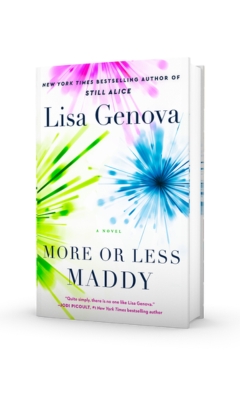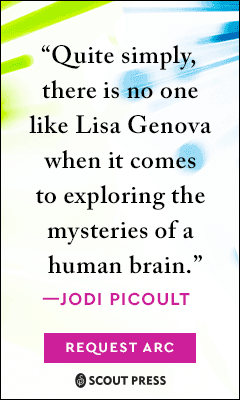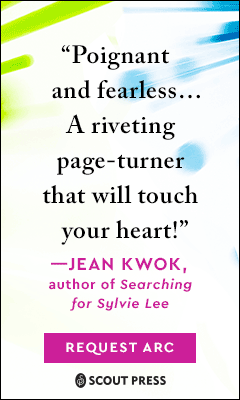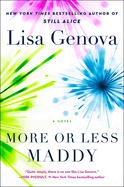More or Less Maddy
by Lisa Genova
Harvard-trained neuroscientist Lisa Genova debuted as a novelist with Still Alice (2007), about a woman who is diagnosed with early-onset Alzheimer's disease. Genova's later novels Left Neglected, Love Anthony, Inside the O'Briens, and Every Note Played feature characters with hemi-spatial neglect, autism, Huntington's disease, and ALS, respectively. Her sixth novel, More or Less Maddy, follows a young woman with bipolar disorder. As ever, Genova brings both an expert understanding of the neuroscience and a masterful eye for compelling characters in an emotionally textured narrative. Maddy's story is completely absorbing; it may keep readers up all night.
Maddy Banks has had a privileged upbringing in suburban Connecticut. There were some tough times in her early childhood, and her father is a shadowy figure. But since her mother, Amy, remarried, it's been easy: dinners at the country club, a popular boyfriend, a highly successful older sister, and an easygoing jock of an older brother. In high school, "each day was laid out for her like a matching outfit on a bed, when both her inner and outer worlds felt organized, predictable, happy, and light. Life was handed to her like a potted succulent, small and tidy and requiring little effort to maintain." But the transition to college has not been smooth: "She remembers herself then... and it's as if she was a different girl in another lifetime. She can't pinpoint exactly how, but she doesn't feel like she used to feel."
Her first year at NYU is a shock: "The impossible-to-keep-up-with workload, living with a roommate who drove her crazy, having no clue what to major in, still not finding her passion or her tribe, losing [her boyfriend] Adam. Twice." In her sophomore year, Maddy's diagnosed at the student health center with depression. The antidepressants she's prescribed help to set off her first manic episode, a big splashy event that results in her first stay in a mental hospital. Maddy and her family--who are loving, if not always graceful with the challenges they face--are in for a roller coaster.
In her more stable moments, and especially during the hypomania that often precedes full mania, Maddy develops an interest in stand-up comedy. Along with her love for Taylor Swift--and delusions about their friendship, with a budding business and creative relationship--Maddy's passion for comedy becomes a trigger for her mother: getting excited about comedy, Amy Banks believes, means a manic episode is imminent. But while Maddy does not in fact have a personal relationship with Taylor Swift, she does have a gift and a passion for comedy. In Amy's country-club world, this is not a reasonable life path. But Maddy wants it to be. It is one of the tricks of bipolar disorder that "real" excitements can be mistaken for illness, making it difficult for Maddy to pursue her legitimate dreams.
Maddy, her family, and readers learn about bipolar disorder together, with accompanying denial, anger, grief, the ups and downs of sorting out medications and side effects, and relapses. It is heartrending to see Maddy's anguished efforts to come to terms with her disorder and to dissect what is real and healthy from what is delusion. Readers are privy to her self-talk: "It's okay to feel disappointed and sad."; "It's okay to be happy."; "It's okay to be giddy." It is one of the greatest gifts of fiction to allow readers into experiences that are not their own, to find empathy. Genova's descriptions of Maddy's episodes are evocative, clear, and relatable: "Before her hypomania ripened to rotten, there was a delicious sweetness to her thoughts and life. She had a massive amount of unearned confidence in her ability to do anything that struck her fancy. She made big dick energy look flaccid by comparison."
Secondary characters are equally convincing and essential. Amy is capable of actions that frustrate Maddy (and readers), but she also genuinely wants the best for her child. Maddy's sister, Emily, is almost too perfect--life comes easily for her, and it's the life of their mother--but she is goodhearted, and that seems to be the life she truly wants. Maddy's high school boyfriend, Adam, is one example of the gradual realization that things are not always as they appear. He had the right markers--basketball star, handsome, popular--but readers, and Emily, see some red flags in his treatment of Maddy, who goes on to make other exemplary friends and meet other objectionable characters along her rocky path.
It is an important element of Maddy's development that she chooses to embrace her own unique self--her sense of humor, her interests, her differences--rather than follow the cookie-cutter plan laid out by her upbringing. "When Maddy was growing up, being normal was always the unquestioned goal.... Normal was her default, unexamined way of life. It meant fitting in, blending with the colors, sounds, and shapes around her." All young people are out to find themselves; Maddy must live her own version of that. She is not defined by her disease, but is rather a complex young woman navigating the expected tumult of coming-of-age with added complications. Her story is affecting, harrowing, beautiful, and enlightening, as well as a great pleasure to read. --Julia Kastner








